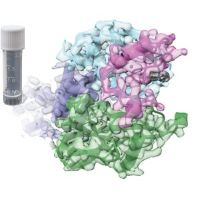Specification
| Description | Recombinant protein from the full-length sequence of homo sapiens MER proto-oncogene, tyrosine kinase (MERTK) (NM_006343). |
| Organism | Homo sapiens (Human) |
| Expression Host | Human Cells |
| Tag Info | His or DYKDDDDK. Please contact us if you need further information or require specific designed tag. |
| Purity | Greater than 90% by SDS-PAGE gel |
| Uniprot ID | Q12866 |
| Entry Name | MERTK_HUMAN |
| Gene Names | MERTK MER |
| Alternative Gene Names | MER |
| Alternative Protein Names | Tyrosine-protein kinase Mer (EC 2.7.10.1) (Proto-oncogene c-Mer) (Receptor tyrosine kinase MerTK) |
| Application | Antigens, Western, ELISA and other in vitro binding or in vivo functional assays, and protein-protein interaction studies; For research & development use only! |
| Buffer | Purified protein formulated in a sterile solution of PBS buffer, pH7.2, without any preservatives |
| Endotoxin | Endotoxin level is < 0.1 ng/µg of protein (<1EU /µg) |
| Length | 999 |
| Molecular Weight(Da) | 110249 |
| Protein Sequence | (The sequence of expressed protein may have some variation from the sequence shown below. Please contact us for the exact sequence.) MGPAPLPLLLGLFLPALWRRAITEAREEAKPYPLFPGPFPGSLQTDHTPLLSLPHASGYQPALMFSPTQPGRPHTGNVAIPQVTSVESKPLPPLAFKHTVGHIILSEHKGVKFNCSISVPNIYQDTTISWWKDGKELLGAHHAITQFYPDDEVTAIIASFSITSVQRSDNGSYICKMKINNEEIVSDPIYIEVQGLPHFTKQPESMNVTRNTAFNLTCQAVGPPEPVNIFWVQNSSRVNEQPEKSPSVLTVPGLTEMAVFSCEAHNDKGLTVSKGVQINIKAIPSPPTEVSIRNSTAHSILISWVPGFDGYSPFRNCSIQVKEADPLSNGSVMIFNTSALPHLYQIKQLQALANYSIGVSCMNEIGWSAVSPWILASTTEGAPSVAPLNVTVFLNESSDNVDIRWMKPPTKQQDGELVGYRISHVWQSAGISKELLEEVGQNGSRARISVQVHNATCTVRIAAVTRGGVGPFSDPVKIFIPAHGWVDYAPSSTPAPGNADPVLIIFGCFCGFILIGLILYISLAIRKRVQETKFGNAFTEEDSELVVNYIAKKSFCRRAIELTLHSLGVSEELQNKLEDVVIDRNLLILGKILGEGEFGSVMEGNLKQEDGTSLKVAVKTMKLDNSSQREIEEFLSEAACMKDFSHPNVIRLLGVCIEMSSQGIPKPMVILPFMKYGDLHTYLLYSRLETGPKHIPLQTLLKFMVDIALGMEYLSNRNFLHRDLAARNCMLRDDMTVCVADFGLSKKIYSGDYYRQGRIAKMPVKWIAIESLADRVYTSKSDVWAFGVTMWEIATRGMTPYPGVQNHEMYDYLLHGHRLKQPEDCLDELYEIMYSCWRTDPLDRPTFSVLRLQLEKLLESLPDVRNQADVIYVNTQLLESSEGLAQGSTLAPLDLNIDPDSIIASCTPRAAISVVTAEVHDSKPHEGRYILNGGSEEWEDLTSAPSAAVTAEKNSVLPGERLVRNGVSWSHSSMLPLGSSLPDELLFADDSSEGSEVLM |
Background
| Function | FUNCTION: Receptor tyrosine kinase that transduces signals from the extracellular matrix into the cytoplasm by binding to several ligands including LGALS3, TUB, TULP1 or GAS6. Regulates many physiological processes including cell survival, migration, differentiation, and phagocytosis of apoptotic cells (efferocytosis). Ligand binding at the cell surface induces autophosphorylation of MERTK on its intracellular domain that provides docking sites for downstream signaling molecules. Following activation by ligand, interacts with GRB2 or PLCG2 and induces phosphorylation of MAPK1, MAPK2, FAK/PTK2 or RAC1. MERTK signaling plays a role in various processes such as macrophage clearance of apoptotic cells, platelet aggregation, cytoskeleton reorganization and engulfment. Functions in the retinal pigment epithelium (RPE) as a regulator of rod outer segments fragments phagocytosis. Plays also an important role in inhibition of Toll-like receptors (TLRs)-mediated innate immune response by activating STAT1, which selectively induces production of suppressors of cytokine signaling SOCS1 and SOCS3. {ECO:0000269|PubMed:17005688}. |
| Pathway | |
| Protein Families | Protein kinase superfamily, Tyr protein kinase family, AXL/UFO subfamily |
| Tissue Specificity | Not expressed in normal B- and T-lymphocytes but is expressed in numerous neoplastic B- and T-cell lines. Highly expressed in testis, ovary, prostate, lung, and kidney, with lower expression in spleen, small intestine, colon, and liver. |
QC Data
| Note | Please contact us for QC Data |
| Product Image (Reference Only) |  |

